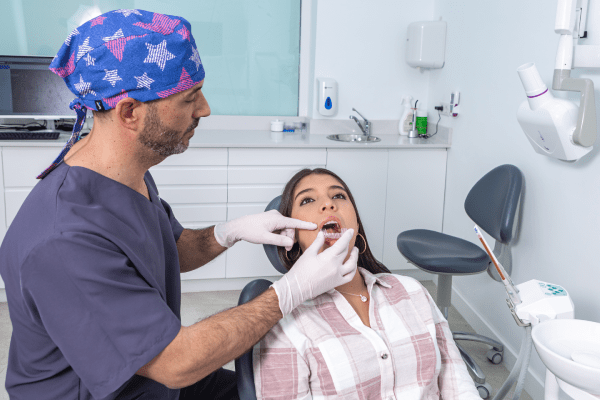What Is NHS Dental Treatment?
NHS dental treatment covers dentistry services provided by the UK’s National Health Service, which is funded by public funds. This system aims to facilitate access to basic dental health services and keep costs low. Treatments are generally divided into three main price bands, which allows patients to pay a fixed fee depending on the type of treatment they need. The NHS covers various services such as emergencies, routine check-ups, fillings, and dentures. The system is designed to ensure everyone has access to basic dental care at an affordable price.
Who Can Access NHS Dental Treatment?
Everyone living and registered in the UK can access NHS dental treatment. This also includes individuals who are not UK citizens but are legally resident in the country. However, due to the limited number of NHS dentists, it may be difficult to find a clinic that is accepting new patients in some areas. Therefore, it is important to start your research early to find an NHS dentist and to get on a waiting list for an appointment.
Is NHS Dental Treatment Completely Free?
No, NHS dental treatment is not completely free. Treatments are divided into three different price bands determined by the complexity of the procedure. Only certain groups, such as pregnant women, mothers in the first 12 months after giving birth, young people under 18, and individuals receiving certain social benefits, are entitled to free treatment. Other patients pay standard fees determined by the type of treatment.
What Are the NHS Dental Treatment Price Bands?
NHS dental treatment consists of three price bands. Band 1 covers basic procedures such as dental examinations, diagnoses, emergency treatments, and dental hygiene. Band 2 includes more comprehensive treatments such as fillings, root canal treatment, and tooth extractions, in addition to all procedures in Band 1. Band 3 covers all procedures in Band 1 and 2, as well as more complex treatments such as crowns, bridges, dentures, and dental restorations.
How to Get an Appointment for NHS Dental Treatment?
Getting an appointment for NHS dental treatment starts by finding an NHS dentist who is accepting new patients. You can search for clinics accepting new patients on the official NHS website or through your local health services provider (Trust). Once you find a clinic, you should contact them directly to book an appointment. In some areas, you may need to be placed on a waiting list due to high demand.
Is It Possible to Get Emergency Dental Treatment?
Yes, it is possible to get emergency dental treatment under the NHS. Emergencies include situations like severe pain, uncontrollable bleeding, or swelling in the face. In such cases, you should first call your registered dentist. If it is outside of office hours or you do not have a registered dentist, you can call the 111 phone line to be directed to the nearest emergency dental service.
What Is the Difference Between Private and NHS Dental Treatment?
The biggest difference between private and NHS dental treatment is cost and waiting time. Private treatments are generally more expensive but offer shorter waiting times and a wider range of treatments. The NHS is more affordable, but the waiting time for an appointment can be long, especially in popular areas. While private treatments may use more modern or different materials and techniques, NHS treatments are performed with standard, but reliable methods.
Is Root Canal Treatment Covered by the NHS?
Yes, root canal treatment is covered under the NHS. This procedure falls under the Band 2 price band. It involves the removal of infected pulp tissue from a tooth due to decay or damage and the cleaning and filling of the inside of the tooth. This aims to preserve the tooth without the need for extraction.
Is Tooth Extraction Covered by the NHS?
Yes, tooth extraction is covered under the NHS and is included in the Band 2 price band. It is a procedure that is resorted to when a tooth is too damaged or decayed to be saved. The NHS covers all basic surgical procedures necessary to maintain oral health.
What Materials Does the NHS Use for Dental Fillings?
The NHS generally uses composite (white) fillings for aesthetic reasons in visible areas and amalgam (silver) fillings for back teeth. The choice of material depends on factors such as the tooth’s location and the patient’s clinical condition. Amalgam fillings are durable and long-lasting, so they are generally preferred for back teeth where chewing pressure is high.
Are Cosmetic Dental Treatments Covered by the NHS?
The NHS generally only covers treatments that are considered clinically necessary. Therefore, cosmetic dental treatments such as teeth whitening, porcelain veneers, or laminates are not covered under the NHS. Such procedures are performed for purely aesthetic purposes and can be done through private clinics, with the patient covering the full cost.
How Does NHS Dental Treatment Work for Children?
In the UK, all NHS dental treatments are free for children under 18 and full-time students under 19. This includes procedures such as routine check-ups, fillings, root canal treatments, and braces. This service aims to protect children’s dental health from an early age and help them develop healthy habits.
Can There Be Extra Payments for NHS Dental Treatment?
The price bands set for NHS dental treatment generally cover the entire treatment. However, if the patient requests a better material (for example, a white filling instead of amalgam), additional fees may be charged. These extra fees are usually communicated to the patient by the dentist before starting the treatment.
Are Braces (Orthodontics) Covered by the NHS?
The NHS only covers braces (orthodontics) when they are clinically necessary rather than for aesthetic appearance. The patient’s condition is evaluated using a system called IOTN (Index of Orthodontic Treatment Need). This index determines the urgency and necessity of the braces treatment. Generally, treatment is offered free of charge in serious cases where the teeth are causing functional problems.
How to Find an NHS Dentist?
You can use the official NHS website to find an NHS dentist who is accepting new patients. On the website, you can search for dentists in your area and check their patient status. Alternatively, you can call the NHS 111 phone line to get information. Especially in large cities, you may have difficulty finding a new dentist, so it may be helpful to be patient and apply to more than one clinic.
What Documents Are Required for NHS Dental Treatment?
For NHS dental treatment, basic identification documents such as an ID card or passport are usually sufficient. If you are entitled to free treatment (for example, if you receive social benefits), you also need to bring documents that prove this. At your first visit to the dentist, you may be asked to fill out a form that includes your personal and contact information.
How Often Should NHS Dental Check-ups Be Done?
There is no definite time limit for NHS dental check-ups, and this depends on the dentist’s recommendation. Generally, a check-up once a year is recommended for people with a healthy oral structure, while people with oral and dental health problems may need to go for more frequent check-ups. The purpose of the check-ups is to detect possible problems at an early stage and to maintain dental health.
Is the Quality of NHS Dental Treatment Different from Private Treatment?
The quality of NHS dental treatment meets the same basic standards as private treatments. Dentists are required to comply with the standards set by the General Dental Council (GDC). However, private clinics can generally offer a wider range of materials and technology. While NHS treatments focus on functional results, more emphasis can be placed on aesthetic details in private treatments.

How Are NHS Dental Prostheses Covered?
Procedures such as prostheses and bridges are covered under the NHS’s Band 3 price band. This covers the making of full or partial dentures and bridges. The NHS dentist will determine the most suitable type of prosthesis for you. The quality and material of the prostheses may not be as varied as in private treatments, but they are guaranteed to be functional and durable.
How Often Do NHS Dental Treatment Fees Change?
NHS dental treatment fees are determined by the UK government and are usually updated every April. These updates are made to reflect changes in inflation and the cost of health services. It is important for patients to check the current prices on the official NHS website or at dental clinics.
What Happens If More Than One Treatment Is Needed?
If you need more than one treatment in a single appointment (for example, a filling and a root canal treatment), all these treatments are priced under the same fee band. This means you will only pay the Band 2 fee once for all the procedures. However, you may need to pay different fees for procedures in different fee bands.
Is Teeth Whitening (Bleaching) Covered by the NHS?
No, teeth whitening (bleaching) is not covered by the NHS. This procedure aims to whiten the color of the teeth for aesthetic purposes and is not considered a clinically mandatory treatment. To get teeth whitening, you need to go to a private dentist and cover all the costs yourself.
What Are the Disadvantages of NHS Dental Treatment?
The biggest disadvantage of NHS dental treatment is the long waiting lists and the difficulty of finding an appointment, especially in large cities and popular areas. Also, NHS treatment generally only covers basic functional and clinically necessary procedures. If you want more aesthetic results or a wider choice of materials, you may need to opt for private treatment.
How Do I Evaluate Clinics That Offer NHS Dental Treatment?
When evaluating an NHS clinic, you can start by reading reviews from other patients and looking at the clinics’ websites. Try to get information about the dentists’ experience and the technologies they use. Additionally, checking if the clinic is inspected by the CQC (Care Quality Commission) can give you confidence.
Is NHS Dental Treatment Free for Pregnant Women and New Mothers?
Yes, NHS dental treatment is free for pregnant women and mothers in the first 12 months after the birth of their baby. This right is given due to the importance of protecting dental and oral health during and after pregnancy. To benefit from this right, you need to show your pregnancy or birth certificate to the dentist.
Do I Need to Go to a Hospital for NHS Dental Treatment?
For NHS dental treatment, you generally need to go to local dental clinics rather than hospitals. Hospitals usually only accept patients who will be referred for more complex or surgical operations. Therefore, it is important to first find a dental clinic for routine check-ups and treatments.
Are Implants Covered by the NHS?
No, dental implants are generally not covered by the NHS. Implants are a modern and expensive method used to replace missing teeth and are usually considered an aesthetic treatment. However, in very rare and specific clinical situations (for example, bone damage due to cancer), there may be exceptional cases where implants can be covered by the NHS.
How to Complain About NHS Dental Treatment?
If you are not satisfied with your NHS dental treatment, you should first direct your complaint to the clinic itself. Most clinics have a procedure for resolving complaints. If you are not satisfied with this procedure, you can apply to the Dental Complaints Service, which is the official mechanism for complaints in the NHS.
What Happens If I Cancel an NHS Dental Appointment?
If you need to cancel or change your NHS dental appointment, you generally need to inform the clinics at least 24 hours in advance. If you fail to attend your appointment without notice twice, you risk being removed as a patient from that clinic. This can make it difficult for you to find a new dentist.
Are Gum Diseases Covered by the NHS?
Yes, the treatment of gum diseases is covered under the NHS. This includes procedures such as teeth cleaning, plaque removal, and the treatment of gum inflammation. These services fall under the Band 1 or Band 2 price band and are vital for maintaining oral health.
What Materials Are Used in NHS Dental Treatment?
The materials used in NHS dental treatments are those that are generally accepted and meet reliable standards. For example, amalgam and composite are used in fillings, while metal-ceramic or metal alloy materials are used in crowns and bridges. These materials are durable and functional, but they may not offer as wide a range of aesthetic options as in private treatments.
Do I Need to Register for NHS Dental Treatment?
Yes, you need to register with an NHS dental clinic to receive NHS dental treatment. This registration adds you to the clinic’s patient list and allows you to receive continuous care. However, it can be difficult to find a clinic that is accepting new patients due to high demand.
Are Extensive Dental Restorations Covered by the NHS?
Extensive dental restorations may be covered by the NHS under certain conditions. For example, in cases of tooth loss or severe decay due to an accident, restorations such as crowns or bridges are performed under the Band 3 price band. However, if the purpose of the restoration is purely aesthetic, it may not be covered by the NHS.
How Are NHS Dental Treatment Fees Paid?
NHS dental treatment fees are usually paid directly to the dental clinic at the time of the appointment. Payment methods can be cash or card. If your treatment consists of several stages, you need to make the payment at your first appointment. This payment is valid until your treatment is completed and you do not need to make any extra payments.
In Which Cases Is NHS Dental Treatment Free?
NHS dental treatment is free for people under 18, full-time students under 19, pregnant women, mothers within 12 months after giving birth, and people receiving social benefits such as income support, jobseeker’s allowance, or disability benefits. In these cases, the patient must provide documents proving their identity and that they are receiving benefits.



